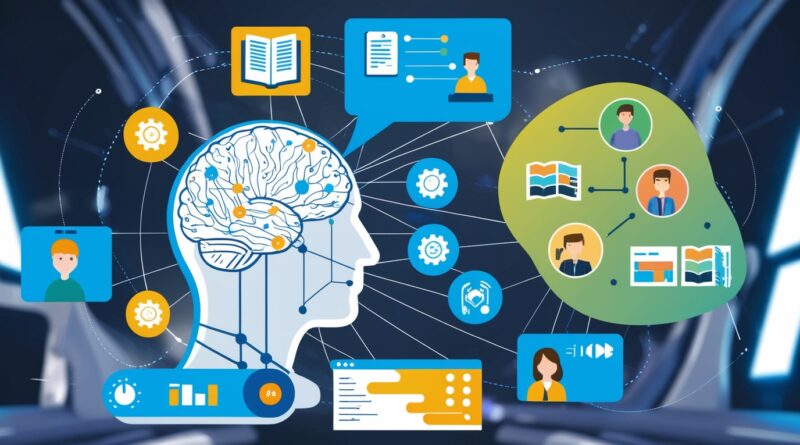Leveraging AI and Automation to Boost Corporate Efficiency
In today’s fast-paced, competitive business environment, companies are constantly looking for ways to improve efficiency, streamline operations, and enhance employee performance. One of the most significant advancements in recent years has been the integration of Artificial Intelligence (AI) and automation into corporate strategies. These technologies are not only improving operational processes but also transforming how organizations approach corporate training and learning.
In this article, we’ll explore how AI and automation are helping businesses boost efficiency, with a particular focus on corporate training solutions that are shaping the future of employee development and productivity.
AI and Automation: A Game Changer for Corporate Efficiency
What is AI and Automation?
- Artificial Intelligence (AI) refers to the simulation of human intelligence processes by machines, especially computer systems. These systems can perform tasks such as decision-making, problem-solving, pattern recognition, and learning from data.
- Automation involves the use of technology to perform tasks with minimal human intervention. It includes everything from software robots automating repetitive tasks to advanced AI systems that analyze data and make real-time decisions.
Together, AI and automation are revolutionizing corporate operations by reducing the time spent on mundane tasks, enhancing decision-making, and driving more personalized experiences for employees and customers alike.
How AI and Automation Drive Corporate Efficiency
1. Streamlining Administrative Tasks
One of the primary ways AI and automation boost corporate efficiency is by taking over repetitive and time-consuming administrative tasks. From data entry to scheduling meetings, automation tools can handle these tasks quickly and accurately, freeing up employees to focus on more value-added activities.
Examples:
- AI-driven chatbots can respond to customer inquiries 24/7, handling basic queries without human intervention.
- Automated scheduling software can coordinate meeting times and appointments, eliminating the need for manual email exchanges.
These tools not only save time but also reduce the risk of human error, ensuring smoother and faster business operations.
2. Enhancing Data-Driven Decision-Making
AI’s ability to process and analyze vast amounts of data enables businesses to make more informed, data-driven decisions. By using machine learning algorithms and predictive analytics, organizations can uncover valuable insights that would otherwise go unnoticed.
Examples:
- AI-powered analytics platforms can help businesses understand customer behavior, sales trends, and market demands in real time.
- Predictive models can forecast future business outcomes, such as revenue projections or inventory needs, allowing companies to make proactive decisions.
With AI handling the data crunching, leaders can spend more time on strategy, planning, and innovation, knowing that decisions are based on accurate, real-time information.
3. Personalizing Corporate Training and Learning Solutions
A key aspect of AI’s role in boosting corporate efficiency lies in its ability to revolutionize corporate training solutions. Traditional training methods often lack the personalization needed to cater to diverse learning styles and paces. However, AI-powered platforms are capable of creating highly tailored training programs that adapt to individual employees’ needs, boosting learning outcomes and engagement.
Key Benefits of AI in Corporate Training:
- Personalized Learning Paths: AI can assess an employee’s strengths, weaknesses, and learning style, then tailor training content to suit their specific needs. For instance, an AI system might identify that an employee struggles with certain concepts and provide targeted resources to help them improve.
- Real-Time Feedback and Assessments: AI-powered training solutions can offer real-time feedback during training sessions, helping employees track their progress and adjust their learning approaches.
- Continuous Learning Opportunities: With AI, employees can engage in continuous learning through on-demand resources that evolve with their professional development needs.
By utilizing AI and automation in corporate training solutions, companies can ensure that their workforce is constantly improving, upskilling, and remaining competitive in their roles.
AI and Automation in Specific Business Functions
1. Human Resources and Recruitment
AI is transforming recruitment by automating candidate sourcing, screening, and interview scheduling. AI-powered recruitment tools can analyze resumes, match candidates with job descriptions, and even conduct initial interviews using chatbots, making the hiring process faster and more efficient.
Example:
- Chatbots that interview candidates can quickly assess qualifications, answer common questions, and schedule interviews, significantly reducing the time HR teams spend on administrative tasks.
This helps HR departments focus on high-value activities like engaging with top candidates and enhancing employee experience.
2. Customer Support and Service
Customer support is another area where AI and automation have had a significant impact. Automation tools, such as chatbots, can respond to customer inquiries at all hours, providing quick and accurate responses to common questions and issues.
Example:
- AI systems can analyze customer interaction data to predict potential issues or queries before they arise, enabling companies to provide proactive service.
By automating routine customer interactions, companies can provide faster service while improving customer satisfaction and reducing operational costs.
3. Marketing and Sales Automation
Marketing automation tools powered by AI can help businesses generate leads, nurture relationships, and personalize marketing campaigns. AI systems can analyze customer data, predict future buying behaviors, and automatically send personalized content to the right customers at the right time.
Example:
- AI-powered email marketing tools can tailor email campaigns to individual customers based on their preferences and previous interactions with the company.
This level of automation increases marketing efficiency, improves customer targeting, and enhances overall ROI.
The Role of Corporate Training Solutions in Embracing AI and Automation
To effectively leverage AI and automation, organizations must invest in corporate training solutions that teach employees how to use these new tools and adapt to changing work environments. Whether it’s for AI literacy, automation tools, or data analysis skills, companies must ensure that their workforce is prepared for the future.
Why Corporate Training Matters:
- Upskilling for the Future: As AI and automation continue to reshape industries, workers need the skills to manage, optimize, and interact with new technologies. Corporate training solutions can help employees stay ahead of the curve by equipping them with the knowledge and tools to succeed.
- Adapting to New Technologies: Employees may feel overwhelmed by the introduction of new AI and automation tools. Effective training programs can ease this transition by offering hands-on experience and support.
- Fostering a Culture of Innovation: By investing in training, organizations demonstrate their commitment to empowering employees and fostering a culture of continuous learning and adaptation.
By using corporate training solutions focused on AI and automation, companies ensure that their teams are equipped with the skills they need to maximize the potential of these technologies, driving corporate efficiency and success.
Final words,
Leveraging AI and automation is no longer a luxury—it’s a necessity for businesses looking to remain competitive in an increasingly digital world. From streamlining administrative tasks to enhancing decision-making and transforming corporate training solutions, AI and automation are powerful tools that can significantly boost corporate efficiency.
For organizations, the key to success lies not only in adopting these technologies but also in ensuring that employees are properly trained and equipped to leverage their full potential. By integrating AI into training programs and providing continuous learning opportunities, businesses can create a more efficient, agile, and skilled workforce, setting the stage for long-term success in a rapidly evolving market.




